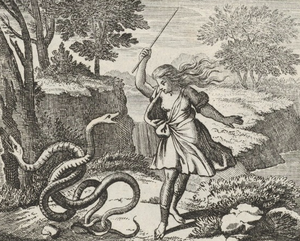The Odyssey( book I)
The narrator calls upon the Muse to help him tell the story of Odysseus. We pick up ten years after the fall of Troy in the Trojan War (the subject of The Iliad). In trying to return home, Odysseus and his shipmates had numerous adventures, but now Odysseus has been left alone on the island of Ogygia for the last eight years, captive of the beautiful goddess Calypso. We are told that Poseidon, god of the sea, will make Odysseus' journey home to Ithaca even more difficult (he is angry that Odysseus has blinded his son, the Cyclops Polyphemus), and trouble awaits the conquering hero back in Ithaca, too.In the hall of Zeus on Mount Olympos, all the gods but Poseidon gather and listen as Zeus reflects upon the moral failings of mortal men. He brings up the example of Aigisthos, who killed Agamemnon and stole his wife, though the gods warned him that Agamemnon's son, Orestes, would someday retaliate - which he justly did. Athena speaks on behalf of Odysseus, pleading with Zeus to free him from Calypso's grasp. He agrees, and the god Hermes will be sent to Calypso to ask her to free Odysseus.
In Greek mythology are the goddesses of the inspiration of literature, science, and the arts.
In Homer's Odyssey, Penelope is the faithful wife of Odysseus. She devised tricks to delay her suitors, one of which is to pretend to be weaving a burial shroud for Odysseus's elderly father Laertes and claiming that she will choose a suitor when she has finished. Every night for three years, she undoes part of the shroud, until Melantho, one of twelve unfaithful serving women, discovers her chicanery and reveals it to the suitors.
A nymph in Greek mythology, who lived on the island of Ogygia, where she detained Odysseus for several years. She is generally said to be the daughter of Atlas the Titan.
- Ithaca(The rocky Ithaca)
The giant son of Poseidon and Thoosa in Greek mythology, one of the Cyclopes described in Odyssey. In the Odyssey, Odysseus blinded Polyhemus. Polyphemus prays to his father, Poseidon, for revenge and casts huge rocks towards the ship, which Odysseus barely escapes.
In Greek mythology, the Sirens were dangerous yet beautiful creatures, who lured nearby sailors with their enchanting music and voices to shipwreck on the rocky coast of their island.
Cassandra
Clytemnestra
The tale: Electra, the daughter of Agamemnon, and her brother Orestes plotted revenge against their mother Clytemnestra and stepfather Aegisthus for the murder of their father, Agamemnon.
# Oedipus complex--- a male child's unconscious desire for the exclusive love of his mother.
Tiresias
A priest of Zeus, and as a young man he encountered two snakes mating and hit them with a stick. He was then transformed into a woman. As a woman, Tiresias became a priestess of Hera, married and had children, including Manto. After seven years as a woman, Tiresias again found mating snakes, struck them with her staff, and became a man once more.When Zeus and Hera asked him which of sex he chose, he chose "woman"that Zeus guessed, Hera struck him blind.Since Zeus could not undo what she had done, he gave him the gift of prophecy.The story of Argus peacock
Hera almost caught Zeus with a mistress named Io, a fate avoided by Zeus turning Io into a beautiful white heifer. However, Hera demanded that Zeus give her the heifer as a present.Once Io was given to Hera, she placed her in the charge of Argus to keep her separated from Zeus. Zeus then commanded Hermes to kill Argus, which he did by lulling all one hundred eyes to sleep. In Ovid's interpolation, when Hera learned of Argus' death, she took his eyes and placed them in the plumage of the peacock, accounting for the eye pattern in its tail.

沒有留言:
張貼留言